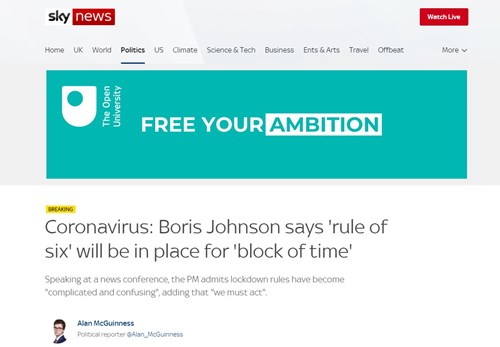The Difference between Search & Display Ads - When To Use Each
09 September 2020
Both beginner & veteran digital advertisers are often trying to figure out whether to use search ads, display ads, or a combination of the two within their digital marketing campaigns. But like with any digital campaign, there is no one size fits all model.
Whether you are just beginning to dip your toes into the world of digital marketing or a seasoned professional looking for a few hints & tips, this is the article for you.
Search & display ads are two of the most important avenues that you should master when it comes to online advertising. Which is better for you? Below we will analyse the various factors that will determine whether search or display advertising will lend itself better to your PPC goals.

One of the most popular forms of PPC advertising is paid search, which enables brands to pay to display adverts above & below the organic results on the Google Search Engine Results page.
Search Ads consist of three main components. The headline, the description (formatted much like any well-crafted Metadata), as well as the display URL. You may also find some adverts that contain Ad Extensions that provide users with some additional information.
Your Quality Score will determine the rankings of your ad, the cost per click as well as how often it appears.

Google display advertising exists within the Google Ads interface; however, it operates quite differently from paid search.
For a start, they aren’t limited to the Search Engine Results Page (SERP) like you would find with search adverts. Instead, display ads appear across the entire Google Display Network, which consists of over 2 million sites & reaches over 90% of online users.
Display adverts help put your ads in front of potential customers, without them having to find you. It helps brands become more involved in the “awareness” & “interest” stages of the marketing funnel. Introducing people to products that they maybe never even knew existed!
Display adverts are more to do with building brand awareness, rather than grabbing people who are ready to purchase right away.
One major benefit that comes with display advertising is the flexibility of the ads. You are able to create a variety of sizes & use an assortment of images which enables greater creativity for your brand to help it stand out amongst competitors, If you need any help creating your display adverts, we have a great in house “Performance Creative” Team who would be happy to help.
One of the standout differences between search & display advertising is that search ads use a “pull” technique, whereas display ads are a “push” approach.
To put this into context, this means that search ads will only be shown to people who are already searching for the types of products & services that you offer. Whereas with display advertising, you can reach an audience based on several different targeting parameters (watching a video, reading emails, browsing the web).
To give yourself an idea of how familiar searchers are with your products & brand, you can determine search volumes using a number of free tools such as AdWords Keyword Planner tool and Google Trends. Here at Loud Mouth Media we use a number of advanced paid-for tools such as SEMRush, which can really help you hone in on the exact terms that are being searched as well as their frequency.
If you find that your brand's products or services already have a significant search volume, then it would definitely be a good idea to start out with a search campaign. However, if you aren’t seeing a high search volume, you will probably find it more beneficial to focus on display advertising in order to drum up some brand awareness for your brand & what you offer.
Two of the most important metrics that you need to consider with display & search ads are the conversion rate & the cost per click.
Conversion rate tends to be around 3% for search campaigns, while the average for display campaigns is less than 1%. This doesn’t come as a surprise. We have already addressed the fact that the Search Network deals with audiences who are ready to make a purchase, so they are more likely to convert than those who are at an earlier phase of the buyer’s journey.
With the average conversion rate being lower for display adverts, it must also be recognised that the cost per click is significantly less also (about three quarters less in fact). Obviously, this sounds more appealing to businesses that have less of an ad budget, but you need to ensure that you are choosing a strategy that best caters to your business goals.
We have an article about the Click-through Rates on Google Ads, that you may want to check out!
If you are new to digital marketing or are creating low budget campaigns, search engine advertising is probably the best place to get started for a few different reasons. By being able to bid on highly relevant keywords you are able to have more control over who you reach, which should help produce more quality leads & therefore higher conversion rates. In doing so you will see a better return on investment (ROI).
The success of search campaigns is much easier to measure. Once you have successfully refined your search campaign, it may make it easier for you to request more of a budget to expand into Display Advertising & the Google Display Network.
If you offer an emergency product or service i.e locksmiths, plumbers or mechanics, the odds are that people are using the search engine to find you there and then. Thus, it makes sense to start with search ads, as you are looking to capture this audience with the intent to make a purchase.
Top Tip: Most people looking for these services will be doing so on their mobile phones. You want to make it as simple as possible for the searcher to contact you, so consider implementing call extensions within your search ads, to persuade them to click on your ad over a competitor.

If you are trying to target a local audience, search ads are also the way to go. Display ads are for targeting audiences over a wider area. Search ads will offer you the best return when targeting a smaller & more specific audience. Much like with emergency products, people searching for local cafes or restaurants are probably looking to get something to eat there & then, so search ads will definitely be the way to go when trying to garner the attention of people searching “places to eat near me”.
If you are fortunate enough to have a collection of great images & videos within your library, display ads can be a great way to promote your offerings. Particularly if what you offer relies heavily on impressing viewers with how it looks (i.e. clothing & home décor).
It’s worth noting that Google has made a real effort in encouraging people to utilise video content within their campaigns. People are much more likely to engage with video content than typical text & image ads, so take advantage of this wherever possible.
As touched upon above, if you are a new company or if you are selling a unique product or service that people aren’t aware of, focusing on building your brand may be the first port of call.
The Google Display Network offers you the ability to get your brand in front of potential customers.
Display campaigns are often compared to the advertising hoarding at a sporting event. The stadium will be covered with adverts and banners, yet everyone will be focused on the sport.

You may be asking, “How is this a good investment?” Advertisers are aware that these viewers are their consumer base & they relate to their adverts & brand to the sporting experience, which in turn makes these adverts pertinent to the target audience.
Similarly, with display advertising, most people aren’t opening their web browsers to digest all their favourite adverts of the day… they most likely will be watching videos, reading their favourite blogs & keeping up to date with the latest news.
With display ads, you can target your audience based on their demographic as well as the keywords & content they are entering into the search engine. You can also target specific websites that your audience has spent time on recently.
Be aware, that much like advertising banners at sporting stadiums, the viewer may not be in the market for the product or service you are advertising currently. However, when they are in the “consideration” & “conversion” phase of the marketing funnel. There is a good chance they will remember your brand.
A tip to help gauge the effectiveness of any branded display campaigns that you're running is to create a search campaign that only targets branded terms. In doing so, you will hopefully be able to see an increase in impressions for your brand name, the longer the campaign runs.
This highlights how you can use a push approach to create a pull for your brand & its products/services.
As we have highlighted earlier in the article, search ads suit businesses with a shorter sales cycle without much need for retargeting. However, if your product or service isn’t purchased immediately (i.e. vehicles & televisions), you must ensure that your brand remains in the forefront position in the minds of any potential consumers whilst they are in the consideration and purchasing stages.
Ensure you retarget customers who have interacted with your brand in the past. We have found this strategy useful when it comes to eCommerce stores, particularly when retargeting adverts at those who have left abandoned shopping carts.
You can see that there are obvious benefits to both, but in reality determining what suits best for you can only be determined on a case by case basis. Hopefully, we have helped you determine what best suits you & your situation.
If however, you would like a bit more guidance in relation to creating search or display campaigns, or any other kind of online advertising for that matter, Loud Mouth Media can help you out. Talk to one of our strategists who will find an option that best caters for you & your consumers. We can help segment your audiences & produce campaigns you will see success in.